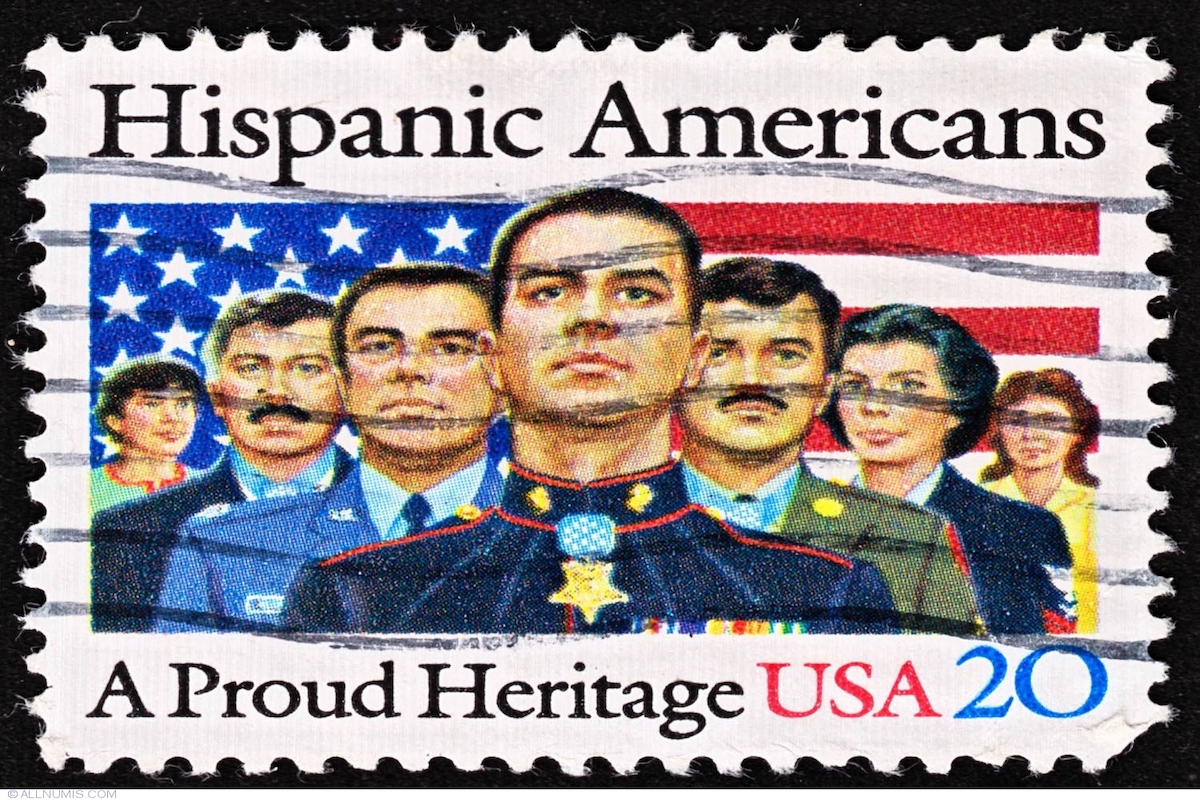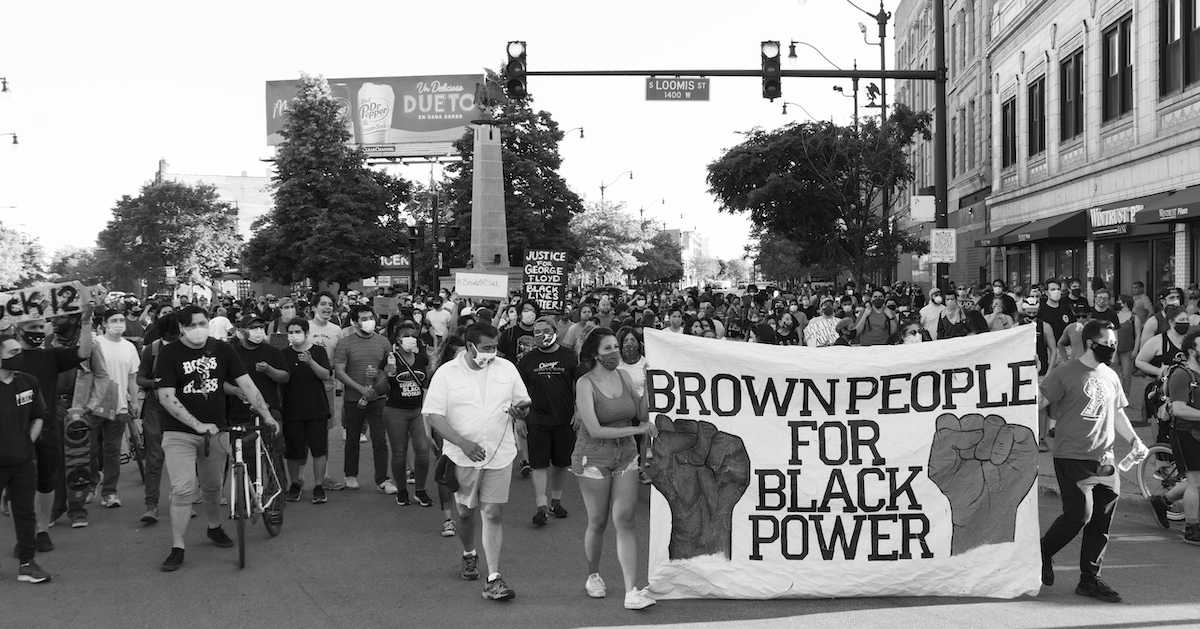

A stamp from the 1980s celebrating Hispanic Americans.
What Hispanic Heritage Month has come to mean to me, especially over the last three years, is that it’s about sharing our cultural identities with the rest of America. Sharing the impacts on our lives from those whose shoulders we stand on. What they taught us. Their strategies. Their ideas. Their activism. Teaching us to be heard. I try to celebrate our leaders as reminders that as Latinos, we are consistently presented with the opportunity to unite for our collective political gain. It’s about liberation as much as it is about equality and justice in our communities.
It’s about celebrating our respective cultures. An opportunity to be cultural accelerators. To share our family’s recipes, tell our family’s stories, and bring people into the culture of great food, great conversation, and great music. It’s about celebrating old traditions and creating new ones while embracing those who join us to learn about and understand the myriad cultures that make up the Latino community in America. It’s about representing a diversity that brings people together.
While many may take the opportunity presented by the month to rightly point out the colonialist nature of the event, the language we use, and the anti-Indigenous and anti-Black nature of it all, we should also look back at the pioneers who came before us and elevate the voices who are otherwise overlooked. Hispanic Heritage Month could be what we choose it to be—while we continue having the important conversations the Latino community is already is having.
Spanish and English are colonialist languages and we refer to our broader community as Latino or Latinx (as much as some people hate it) because that’s how we’re identified in the United States, both socially and politically. We also can’t solely blame colonizers for being exclusive of certain skin tones. We are the result of generations of our ancestors that propped up that behavior. We have the power to change it by finally addressing the colorism within our own respective communities—aggressively. We each have our own work to do.
Similarly, we could take control of what Hispanic Heritage Month means by taking ownership of it. By planting our collective flags in America’s history books and staking our claim. I see it like this: if it’s on us to advocate for ourselves and share our histories, particularly in America, we should use what we’ve got to get it done. We’re not going to decolonize America overnight, but we can take steps to do get us close by playing their game to our collective benefit.
Identity Crises
Latinos can’t be defined by a singular term. We come from so many different backgrounds that sometimes the only thing some of us may have in common is that we come from generations of colonization. What’s true in Puerto Rico or the Dominican Republic may not be true in Colombia or Guatemala. There are just as many differences as there are similarities between any two countries and cultures.
However, in the United States, there has been an effort to classify us as one group for several decades, whether it be Hispanic, Latino, Latinx, Latino American, or whatever they come up with next. While many people, including me, balk at this idea, we have to consider the collective power we could exert if we were to embrace such a notion. As long as we maintain control of the narrative and how we move forward, we can use it to help the broader Latino community.
It could be argued the lack of attention the Latino community receives is a result of not being on message as a community. This is particularly true for progressive Latinos. Conservative Latinos, especially now, are easily identified based on the simplistic logic of how they vote. Some are driven by their anti-abortion beliefs despite being somewhat progressive; others have bought fully into American whiteness (white supremacy); some are die-hard anti-socialists who think anyone other than a Republican is communist.
But, one thing is certain, they can all be identified simply as Trump supporters these days.
More progressive Latinos struggle with unified messaging because we’re critical thinkers about the issues that impact us almost to a fault. We sometimes get hung up on the language used despite the harmless intent behind its use. We get hung up on semantics and fight each other while Latinos on the other side move forward based on their self-interests. To counter those who work against us, we must have some form of unity while we continue to discuss the tougher issues moving forward.
My vision of a Latino coalition looks something like this: demanding immigration reform; addressing gun violence; improving access to quality educational resources; broad police reforms; improving access to quality affordable healthcare within the community; and rethinking Latin American policy just to give you an idea. Some could argue that we’re already doing much of this, but who’s representing us? Vendidos? Gusanos? White folks? Colonized minds?
No thanks.
Going further, I would even suggest revisiting the Black-Brown Unity coalition of the 1960s. A coalition such as this will allow us to address the anti-Blackness and anti-Indigenous culture that can be so pervasive in our respective communities. Additionally, forming a Black-Brown Unity coalition can unite us to fight against the many similarities of oppression that we share along with the exorbitant systemic oppression Black and Indigenous communities endure. To create a sense of working toward the common goal of unity in the face of oppression.
Many scholars throughout history recognized the need for unity among people of color emerges from the nature of oppression and its relationship with colonialism, capitalism, white supremacy, and toxic masculinity. Unity among people of color acts as a means of resistance against the power structure of colonialism and white supremacy. A large portion of white America didn’t like the thought of this coalition in the 1960s, and they like it even less now.
Uplifting Communities
As American white supremacy cannibalizes itself, it behooves us to take the opportunity to uplift ourselves, our elders, and our communities. During Hispanic Heritage Month we should be lifting up those living and dead who have helped advance our rights as a group. We should be discussing our history in the United States, about us being a product of colonialism and how that applies to other minority groups who have been victimized by that very same colonialism.
We should be uplifting Afro and Indigenous Latinos and Caribbean islanders who share in our history of oppression. Just because Jamaicans or Haitians don’t speak Spanish doesn’t mean we should lift them up too. In addition, we should also focus on those same voices who’ve moved us forward but have otherwise been ignored over the centuries. There are many and it’s ridiculous to me that they aren’t acknowledged enough. Then, we must uplift each other.
This month doesn’t have to be controversial because of its history of lifting up Anglo-Latinos more than others. We are no longer are in a position where we have to accept what’s given to us in the United States. Our people have contributed to the success of this country more than most white folks simply because our history is one of victimization at the hands of whiteness.
Now, we have the power not just to demand action for our collective community, but to drive the conversations and force the implementation of policies that benefit Latinos, Indigenous people, Black people, and any other oppressed group you can think of. Nothing we do should ever be just about us. It must be about helping and uplifting every oppressed community along the way.
When we show support for the Movement for Black Lives, we are supporting a movement that is inclusive of not just us as a community, but the Afro-Latinos and Caribbean Islanders we see excluded from many conversations. Our movement should be about inclusivity no matter what color one person may be or what privileges they have access to. In addition, it’s up to all of us who benefit from that privilege to use it for the benefit of our collective communities in the U.S.
While we all agree that racism and colorism exist in Latin America, we should also be aware of how the institution of white supremacy in America is what props it up. It’s not a coincidence that when someone with Indigenous ancestry wins an election in Latin America, the United States begins to propagandize that leader’s actions painting them as an enemy that must be removed.
American white supremacy is interested in one thing and one thing only when it comes to Latin America: corporate control of valuable resources. Every time the U.S. has gotten involved in the affairs of Latin America as a result of Latin American leaders taking control of resources and providing wealth for their people; our people. When that happens, U.S. warmongers like Eliott Abrams, John Bolton, Mike Pompeo, and Bill Barr start making moves to take back control of those resources.
A unified Latino community in the U.S. with collective political power can provide additional pressure to end the interventionism from colonialist America. It’s on us to change the mindset.
Conclusion
The power of unity can not be ignored. American white supremacy pays attention because it puts its power at risk. One could argue, with great success, that the bickering about how we are referred to is meant to keep us divided. We’ve seen how these wedge issues impacted many minority communities in the past, and they exist even today.
We must be aware of these things.
In the end, we are not a monolithic community nor can we technically be labeled as a singular community. But if we were to unify, then we begin to really wield some power. We will always have some in our community who will never align with an idea such as this, and that’s fine. But to argue that coalition building is detrimental to anyone is a fallacy of epic proportions. Some of our people have aligned themselves with white supremacy jumping into the existing power structure that impacts us all. Because of them, they are winning and we are being left behind.
Children in cages, asylum seekers imprisoned illegally, family separations, state-sanctioned murders at the hands of police are all elements of white supremacy that the same group I just mentioned doesn’t care about. They, like most conservatives, are simpletons who join the ranks of American whiteness for their own benefit. For their own wealth and prosperity. At the expense of the rest of us who are fighting for each other out here on these streets.
Whether you agree with collectively coming together and embracing the colonialist naming of our communities in the United States or not, we can’t keep letting them win. This, to me, seems like the best and most efficient opportunity we have to represent each other. If you have a better idea, let’s hear it. Otherwise, let’s go kick some ass for all of our brothers and sisters. One thing is certain. I will not just sit on my ass doing nothing as white supremacy dominates our lives.
It ends now and we have the power to end it through coalition-building amongst ourselves.
***
Arturo is an anti-racist political nerd. He is an upcoming author, journalist, advocate for social justice, and a married father of three. He is a top writer in racism on Medium and a regular contributor to Latino Rebels. If you’d like to learn more about the issues covered here, follow him on Instagram.




[…] like “Hispanic” or “Latino” is problematic for many Spanish-speaking members of the Global South for its erasure of our respective cultures. It is, […]